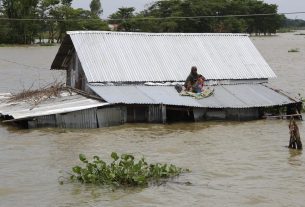Despite the trillion-dollar investments and groundbreaking advances in sustainability, carbon capture, and renewable energy, climate denial remains a significant obstacle to progress — especially in many African and developing nations, where fossil fuel industries and unsustainable mining practices continue to dominate the economy. Even as countries and organizations around the world make strides toward net-zero emissions, renewable energy, and climate resilience, entrenched interests and outdated economic models persist in resisting the future. In many instances, outspoken advocates for climate action are unfairly labeled as traitors or saboteurs, particularly in regions where fossil fuels form the backbone of economic activity.
The question then becomes: how can we catalyze a global wake-up call to climate deniers and saboteurs, helping them recognize the tremendous opportunities they’re missing out on, and the risks they face by ignoring the burgeoning green economy?
The Paradox of Fossil Fuel Dependence in a Green World
For many countries, especially in the Global South, the transition to renewable energy and sustainable practices is viewed as a threat to existing economic systems. Fossil fuels, coal mining, and other unsustainable industries have provided a source of revenue, jobs, and energy security for decades — and in some cases, centuries. Transitioning away from these sectors can seem daunting or even economically disastrous for nations whose very survival seems tied to outdated, polluting industries. Similarly, powerful fossil fuel lobbies may stifle policy shifts by spreading misinformation and fear.
Moreover, some governments and leaders may resist change because they feel it will undermine their political power or economic control, which is often closely tied to fossil fuel extraction and mining. In such contexts, denialism and sabotage are often seen as methods of self-preservation — even if they come at the cost of future generations.
However, this attitude fails to recognize the transformational opportunities within the sustainable and renewable sectors, both in terms of economic growth and job creation. By staying tethered to the past, these countries risk losing out on a key source of global competitiveness in the 21st century.
Key Strategies to Spark a Global Wake-Up Call
To address these deep-rooted challenges and open the eyes of climate deniers and saboteurs, we must deploy a multi-faceted approach. Changing attitudes will require strong leadership, global collaboration, data-driven advocacy, and empowered local action. Here are several key strategies to make that happen:
1. Highlight the Economic Opportunity of the Green Transition
The most effective way to engage climate deniers, especially in developing economies, is to focus on the economic opportunities that the green economy presents. Many leaders and communities fail to see how renewable energy, sustainable agriculture, green manufacturing, and energy efficiency can outperform fossil fuel industries in the long run. This isn’t just about doing the right thing for the environment; it’s about economic growth, job creation, and technological innovation.
Real-world examples should be showcased:
- China has become the world leader in solar panel production, creating millions of new jobs in the renewable energy sector.
- Denmark has transformed its energy landscape by investing in wind power, becoming a global leader in wind turbine manufacturing and exporting its technology worldwide.
- India has seen a massive growth in its solar energy sector, generating hundreds of thousands of new jobs and drastically reducing energy costs in rural areas.
In addition to showcasing the positive impacts in developed countries, we must also highlight examples from the Global South that show how investments in renewables can build resilience, energy independence, and economic diversification. For instance, Kenya has made significant strides in geothermal energy and wind power, while South Africa has committed to renewable energy auctions that promise affordable, clean energy to millions.
By framing climate action as a direct pathway to economic growth, nations can better see the cost of inaction — both in terms of environmental degradation and lost economic opportunities.
2. Empower Local Voices, Leaders, and Activists
In many countries, particularly in the Global South, climate denial is often a top-down phenomenon driven by political elites and corporate interests. To counter this, local activists, community leaders, and indigenous voices must be empowered to speak up and advocate for a transition to a sustainable future. These voices are often the most credible when it comes to the impact of climate change and environmental degradation.
For example, African youth are already at the forefront of climate action, calling for the decarbonization of their economies and advocating for more inclusive energy solutions. Supporting local climate champions through education, capacity building, and funding can help these leaders organize and amplify their voices.
We also need to amplify the success stories of communities that have embraced sustainable practices. These could include stories of local farmers in Ethiopia who have adopted regenerative agricultural techniques or small islands in the Caribbean that are leveraging solar energy for off-grid power. These examples of local change can inspire broader national and international movements for climate action.
3. Leveraging Climate Finance for the Global South
Another critical piece of the puzzle is ensuring that climate finance reaches the countries that need it most. There is a deep disconnect between the billions of dollars being funneled into the green economy and the lack of access to such capital in developing countries. When policymakers see no clear path to financing a green transition, they may remain entrenched in fossil fuel industries.
Countries should come together through international agreements to commit to climate financing for developing nations. Public-private partnerships, green bonds, and multilateral funding initiatives should be expanded to help facilitate the transition.
For example, Africa’s Green Growth Strategy, launched by the African Development Bank (AfDB), aims to mobilize significant financing to support green projects, from clean energy infrastructure to climate adaptation projects. Ensuring that this financing is available — and that developing nations understand how to leverage it — can help reduce the perception that sustainability efforts are a luxury they can’t afford.
4. Education and Awareness Campaigns
The key to overcoming climate denial is ensuring that people understand the facts. The scientific consensus on climate change is clear, and educational campaigns should be ramped up to raise awareness in regions where climate denial is entrenched. These campaigns should focus on the real-world impact of climate change — including extreme weather, loss of agricultural productivity, and rising sea levels — to help decision-makers understand that inaction is no longer an option.
Similarly, media outlets, corporations, and political leaders must take responsibility for disseminating factual information about the urgency of the climate crisis and the solutions available. Targeting youth engagement through social media and educational platforms will ensure that the next generation is equipped with the knowledge to advocate for climate justice and sustainable development.
5. Hold Governments and Corporations Accountable
Lastly, we must hold governments and corporations accountable for obstructing progress. This includes direct action by activists, boycotting companies that fund climate denial, and lobbying governments to adopt strong climate policies. A global movement that shines a spotlight on the hypocrisy of fossil fuel-funded governments or businesses can put tremendous pressure on them to shift their stance.
As global institutions such as the United Nations and the World Bank push for sustainability, they must also address the issue of climate denial by imposing financial penalties on governments and corporations that refuse to act in line with international climate commitments.
Conclusion: A Path to Change
The shift away from fossil fuel dependence and toward a sustainable future is an urgent necessity, but it requires more than just technological advances — it requires a fundamental change in mindset. For countries and leaders entrenched in climate denial and sabotage, the task is to show them the tremendous opportunities they are leaving behind and the risks they are facing by ignoring the global shift toward a greener, cleaner, and more sustainable future.
The transition to a low-carbon economy is not a threat to growth, but a catalyst for it. It’s time for climate deniers and saboteurs to wake up, to see the world as it is, and to realize that the future belongs to those who embrace change, invest in clean energy, and position themselves as leaders in the green economy. Only then can we truly hope to address the global climate crisis and unlock a prosperous future for all.



